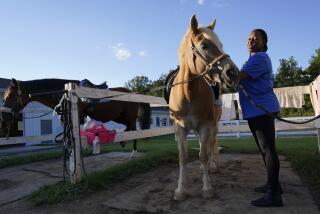Troops Quiz Cheney on Saudi Assignment : GI concerns: Chemical war is on the minds of soldiers who meet the defense chief at Ft. Stewart, Ga.
- Share via
FT. STEWART, Ga. — As they stood among the M-1 tanks and the Bradley Fighting Vehicles on a steamy Tuesday at the sprawling Army base of Ft. Stewart, the young soldier posed a question to Defense Secretary Dick Cheney.
Why, he wanted to know, are he and thousands of his comrades being sent to Saudi Arabia to head off Iraq? “Is it a threat economically or physically?” he asked.
It is “a combination of things,” Cheney replied, going on to point out that the “world’s energy supply is centered” in the region and that the United States has “a lot of friends in the area.”
The encounter came during Cheney’s first visit to a military installation since the massive U.S. military buildup began in the gulf region. He had come to this key base to rally support for the growing U.S. involvement--and his visit did make for impressive photographs.
At the same time, as the soldier’s question showed, the visit highlighted a range of nagging concerns among troops and their families and friends--chief among them that Iraqi President Saddam Hussein might use chemical weapons against U.S. forces.
Several men in the 24th Infantry (Mechanized) Division, which is based at Ft. Stewart and is in the midst of deployment to Saudi Arabia, said that threat is their chief worry.
“I’ve never been in chemical warfare before, never tested our suits, and I’m very concerned,” said Pfc. Joseph Johnson of New Orleans.
Raymond Bartley of Canton, Ohio, who was visiting his son, Donald Bartley, a tank commander, said, “I really believe if (Hussein) is pushed, he’ll use chemicals.
“I hope our guys are prepared for it,” he said as he loaded groceries into his car in nearby Hinesville, Ga.
Deborah Kersten, who runs a fitness center in the area and has friends on the base, said of Hussein: “The man’s not reasonable. He’s insane. If he thinks he’s getting into a desperate situation, that might cause him to do something desperate. I’m definitely concerned about the possibility.”
But officials, from Cheney on down, voice no fear. “We are indeed prepared to deal with” chemical warfare, Cheney said at a news conference after his visit with troops.
Later, in a speech to veterans in Atlanta, Cheney warned Iraq against using chemical weapons, saying the United States has “a wide range of military capability that would let us respond with overwhelming force and extract a heavy price should he be foolish enough to attempt to use chemical weapons on American forces.”
During Cheney’s visit, Maj. Donald Keeling, Ft. Stewart’s base public affairs officer, told reporters that “we train to operate in a chemical environment.” But he acknowledged that there is concern among the rank and file about whether the training is adequate and whether chemical agents like nerve gas and mustard gas can be guarded against.
Mustard gas, a liquid agent made infamous during World War I, causes horrible blisters and has no antidote. Nerve gas, usually used in aerosol form, attacks the nervous system if inhaled or absorbed through contact and can cause convulsions, comas or even death if not properly treated.
“That’s one of the biggest things,” said Sgt. Augustine Battle as he was about to drive away from a shopping center with his wife and children. “We’ve got to get past the gas part. If we get past that, we’ll do what we have to do and come on back home.”
Soldiers are being issued needle-ready kits to strap across their thighs. In case of a nerve-gas attack, they are to slap their thighs, sending a shot of atropine into their systems. They also have heavy charcoal-lined gear called MOPP suits--an acronym for military operational personnel protection--but many soldiers say they are too hot to wear, particularly in the desert.
Thus, many relatives have yet another fear. “I’m afraid some of our guys will get over there and won’t use (the protective clothing) because it holds heat,” Bartley said.
Such topics dominate many conversations here, but the area also is caught up in a fever of patriotism and pride at being chosen to stand up to Hussein.
Yellow ribbons--America’s signal that someone is gone, whether deployed or held hostage--hang on bushes and adorn doors around the base.
Sgt. Benjamin Davis Franklin III said, “We have ‘em pumped. They’re trained, and I love it. I’ve looked every soldier in the eye, and I’ve not seen the scaredness that you might expect. I hope they don’t leave us here long. If we stay here too long, we lose our edge. We’re pumped now.”
More to Read
Sign up for Essential California
The most important California stories and recommendations in your inbox every morning.
You may occasionally receive promotional content from the Los Angeles Times.













